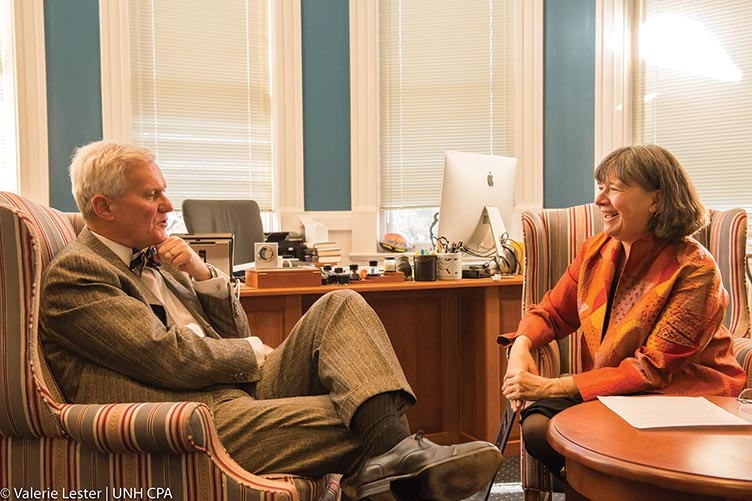
As UNH President Mark Huddleston prepares to retire in June, he reflects upon his decade at the university and its impact on research. In 2008, shortly after his arrival at UNH, Huddleston convened the Presidential Blue Ribbon Panel on Research, charged with laying the foundation for a robust and enduring research enterprise at UNH. He recently spoke with senior vice provost for research Jan Nisbet in his office in Thompson Hall.
How has the research landscape at UNH changed since you arrived in 2007?
It’s changed radically, I think. When I got here, research seemed pretty walled off in a few places, principally — but not entirely — EOS [the Institute for the Study of Earth, Oceans, and Space]. In the intervening decade, the whole institution has begun to take on that mission more fully. Now funding is more evenly distributed throughout the colleges.
When you think about university research broadly and how it fits into the fabric of the institution, do you think we’re going to look different in 10 years?
I think all of higher ed is going to look different in 10 years. UNH will withstand a lot of the turbulence that will hit higher ed because so much of our research enterprise informs our teaching enterprise and vice versa. That probably strengthens both of them in a way that maintains our vitality and integrity more than in bigger institutions, where there’s more of a divorce between those missions.
Is there a research project or event or finding of which you’re particularly proud?
Going to Cape Canaveral for the launch of MMS [NASA’s Magnetospheric Multiscale mission, for which UNH coordinated or constructed nearly half the instruments] was a highlight. That so many students who worked on those instruments came to the launch is a real testament to our model.
I also loved learning about Jim Haney’s research on cyanobacteria in lakes. It’s a discovery that has enormous potential impact on human health in New Hampshire and beyond. Our ocean mapping work is hugely important, as is Nancy Kinner’s work on oil spills. I’m impressed with Northeast Passage’s growth and development, and our American history scholars are among the best. In every single college across the university, there’s something stellar.
What do you wish more people knew and understood about UNH and UNH research?
I wish people knew how much research we do and how much impact it has. Among our peer institutions around the country, I don’t think there’s an appreciation for how much research goes on here or the quality of it, particularly in select areas. I suppose people in those disciplines are aware of it, but I don’t think that’s spilled over to the general reputation of the university. And I really wish people in the state understood our impact. We’d be a very different state if it weren’t for UNH and the research that’s done here.















































